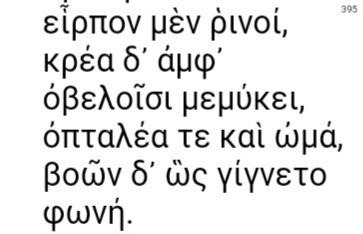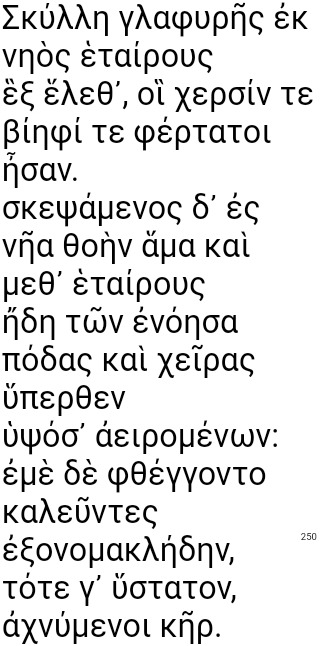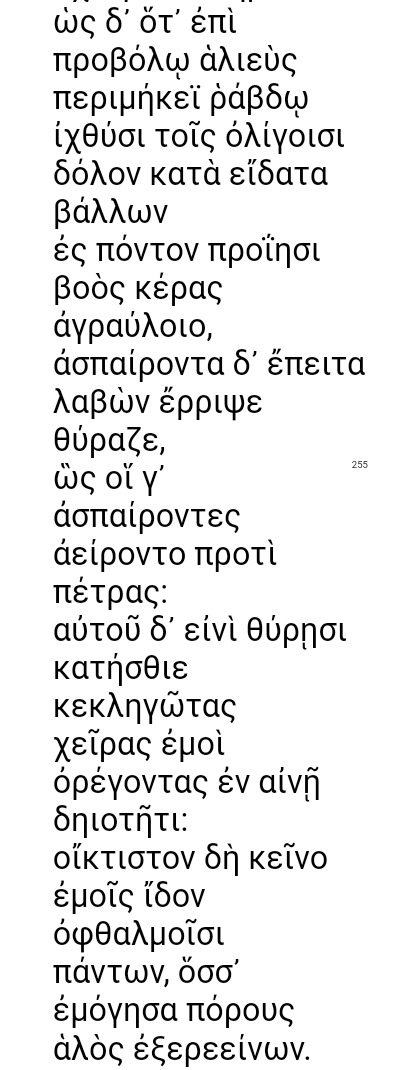#polytlas the one who suffered much
Explore tagged Tumblr posts
Text
The Cattle of Helios Hyperion and Skylla: The animalistic cry for survival (An Odyssey Analysis)
So it has been quite some time since the last time I wrote an analysis on the Odyssey and after I saw some posts by @soarinsugar-homerblog I decided it was about time I wrote one more! This time on the last and fateful moment of the lives of the crew; the sacred cattle of Helios.
Buckle up and bear with me the ride will be wild and long!
So what is the thing that truly shows the divinity of the animals? Was it their godly appearance? Was it the invisible to human eye servants that led them to their grazing spot? Or was it maybe their location and the protection of Helios for them? All of the above are right. However what if the reason behind it was even more profound, even more horrifying than what catches the eye? In my opinion THIS is the true reason and that gives off the most brutal scene in that part of the Odyssey, brutal enough for Odysseus to describe it so thoroughly:

The skin slowly crawled upon the spits and both the roasted and the raw meats would bellow loudly as if they were actual voices
(Translation by me)
Honestly only one word can describe it;
Grotesque!
The scene is nothing less but an absolute grotesque image in the eyes of Odysseus where the meat of the animals seems to gain life and his companions roasting and eating them while Odysseus watches in horror. His men are roasting the meat having a small feast. The scene seems to Odysseus even more horrifying by the fact that his men couldn't even offer a proper sacrifice to the gods (water instead of wine, leaves instead of barley etc).
However why is it so difficult to watch? Is it perhaps that the memories of war awaken inside him and he remembers the brutalities he both saw and caused? Possible but if I may, there is one scene that predates this one and is equally brutal as this specific image. Yet another image that Odysseus describes so thoroughly that might have made some stomachs turn at Homer's time; another scene that remained engraved in his mind forever. It is no other that the Skylla scene!

And Skylla from her cave grabbed out of my ship my strongest six men in arms and body strength and both me and my comrades as we looked up, we could see their arms and legs emerging as they waved them frenzily calling my name in screams till the last moment in their grieving heart
(Translation by me)
And do we think this was brutal enough? Then we must think again for next Odysseus gives us the most specific and absolutely horrendous description in regards to Skylla's feast.

And just like the fisherman upon the tall rock casts his rod with bait to lure the small fishes with food and throws out in the sea the horn of an ox and then he reels in the flopping fish ashore and when he has them, throws them upon the stone; in such a manner she devoured them at the entrance of her cave making screeching sounds and they were waving their arms towards me, struggling in that deadly battle and that was the most lamentable sight we all saw with our own eyes of all I have suffered upon my sea voyages.
(Translation by me)
So for those who still have the contents of their stomachs intact let me make it even more clear; Odysseus describes a wild scene in which a wild creature, no more than an animal, in a blink of an eye snatched six strong and vigorous men and devoured them at her doors without remorse or compassion, just pure animalistic feeding as his comrades flopped like fish caught by the fisherman on the shore while adrenaline kept them awake till the last moment their heart stopped beating! And Odysseus describes it in such a manner; so clear and savage that arguably tops even the grotesque descriptions he had on events like Polyphemus or the Laestrygonians! The ultimate horror scene
Now you might wonder why I correlate the two? I immediately shall tell you. What does the scene of Skylla have in common with the Cattle of Helios Hyperion? Odysseus witnesses someone devouring a prey that is still "alive" and making sound. It doesn't seem like a random choice that Homer decided to share with us that the pieces of meat were still "alive" in one way and I am not convinced that he added that information solely to show how divine the Cattle were neither to create a horror scene. Neither is a mere coincidence that the scene of Skylla is right before the island of Helios or the fact that Odysseus mentions how his men are still grieving the deaths they experienced lastly. I think is much deeper and much more profound than that. Odysseus is in horror at the scene and he has witnessed quite a few harsh situations in his life but this seem to take the cake when it comes to his comrades and doesn't seem to be the mere idea of a blasphemy either.
Odysseus witnesses his men act like Skylla as they devour the pieces of meat that still moo and make sound just like Skylla devoured their still crying and moving men!!!
At that moment of hunger and desperation his men lost the last bits of their humanity. They no longer felt guilt that something was making sound as if it was still alive as they roasted it and slowly devoured it. Their previous experiences and hunger broke them and made them lose the last bits of humanity they had. Not only they committed hubris by defying a God and eating his Cattle, not only didn't they have proper sacrifices to offer but also they didn't stop when they noticed the Cattle were still "alive" even when roasted and they didn't stop not even when they made sounds as if they are being tormented. They didn't care anymore.
They were reduced to the level of a beast in their desperation.
This was the moment when Odysseus knew they were beyond saving because THAT was their real crime: the descent to the mere survival mode; the very bit that separated humans from beast was gone with them. (And even then Odysseus tried to save them, see my other analysis here )
Because this seems to me the true reason why these two scenes were placed side by side. It seems like a combination between cause and effect and also a result of everything that led to that part (adventures, hunger etc) and I am surprised that we don't see more people talk about it. That was the moment where his men reduced from humanity to savagery because as Eurylochus said; there is nothing worse than dying of hunger. And ironically Odysseus seems to quote on that too as he speaks on the basic need of hunger when he is under disguise in his own palace; somehow seems like this moment rings in his mind forever.
Food for thought (pun intended). Let me know your thoughts to the comments and reblogs below!
#katerinaaqu analyzes#greek mythology#odysseus#tagamemnon#the odyssey#homeric poems#odyssey#skylla#scylla and charybdis#scylla#cattle of helios#helios hyperion#odysseus was severely traumatized#survival horror#homer odyssey#homeric epics#homer#polytlas the one who suffered much#epic#epic cycle#the epic cycle#homer's odyssey#skylla and charybdis#animalestic survival stories#odysseus companions#odysseus comrades#hubris#nemesis#hubris and nemesis#food for thought
54 notes
·
View notes
Text
felt like translating a little bit of the preamble to the edition of the odyssey I own (very good translation with super insightful annotations btw):
Through all these tales we see the traits that make up the personality of the protagonist of the Odyssey. Odysseus is, at the same time, a liar and a generous man, he's cautious and brave, a smooth operator and a loyal husband. This is what's extraordinary about this stupendous character: he's not one-note, like Achilles, who only yields and is humanized at the death of Patroclus, hellbent on revenge, or at the tears of a supplicant Priam, this time moved by compassion by the suffering old man and afflicted by the thought of his own aging father Peleus. In contrast, Odysseus has a much richer personality. Throughout the poem he never stops thinking about returning home, he, however still takes on risky adventures, and while he is intelligent enough to trick the cyclops, it was him who couldn't resist the temptation of entering the one-eyed monster's cave.
One minute he's incredibly prudent (like when he covers his crewmates' ears with wax to resist the deadly fascination of the sirens' song while he gets tied up to the mast of the ship, following Circe's wise advice to a letter), and the next he's recklessly daring (like when he gets armed, grabs two spears and gets ready for the grueling and disproportionate feat of fighting rocky Scylla). Such is homeric Odysseus, a hero with a complex personality who acts in an equally complex epic poem wherein diverse legends have converged. While the Iliad tells of a mere episode of the Trojan War, which serves both as a setting and a cause of Achilles' rage and allows for war feats and human feelings and passions to be described, the Odyssey is the epic poem about a character who integrates not only the adventures he experiences, but also the actions of other characters into a narrative whole. Around the figure of Odysseus polytropos and polytlas, gather gods, beggars, suitors, loyal and disloyal servants, nymphs, witches, giants, cannibals, hospitable men, the souls of the dead, the caring nursemaid, the loyal dog and his dearest loved ones: his parents, his son, his loving wife.
Antonio López Eire
48 notes
·
View notes
Text
GUYS!!! CHECK THIS AMAZING PIECE OF ART INSPIRED BY THIS ANALYSIS ✨️
Thank you so much @soarinsugar-homerblog thank you for holding The original Odyssey alive ❤️
The Cattle of Helios Hyperion and Skylla: The animalistic cry for survival (An Odyssey Analysis)
So it has been quite some time since the last time I wrote an analysis on the Odyssey and after I saw some posts by @soarinsugar-homerblog I decided it was about time I wrote one more! This time on the last and fateful moment of the lives of the crew; the sacred cattle of Helios.
Buckle up and bear with me the ride will be wild and long!
So what is the thing that truly shows the divinity of the animals? Was it their godly appearance? Was it the invisible to human eye servants that led them to their grazing spot? Or was it maybe their location and the protection of Helios for them? All of the above are right. However what if the reason behind it was even more profound, even more horrifying than what catches the eye? In my opinion THIS is the true reason and that gives off the most brutal scene in that part of the Odyssey, brutal enough for Odysseus to describe it so thoroughly:

The skin slowly crawled upon the spits and both the roasted and the raw meats would bellow loudly as if they were actual voices
(Translation by me)
Honestly only one word can describe it;
Grotesque!
The scene is nothing less but an absolute grotesque image in the eyes of Odysseus where the meat of the animals seems to gain life and his companions roasting and eating them while Odysseus watches in horror. His men are roasting the meat having a small feast. The scene seems to Odysseus even more horrifying by the fact that his men couldn't even offer a proper sacrifice to the gods (water instead of wine, leaves instead of barley etc).
However why is it so difficult to watch? Is it perhaps that the memories of war awaken inside him and he remembers the brutalities he both saw and caused? Possible but if I may, there is one scene that predates this one and is equally brutal as this specific image. Yet another image that Odysseus describes so thoroughly that might have made some stomachs turn at Homer's time; another scene that remained engraved in his mind forever. It is no other that the Skylla scene!

And Skylla from her cave grabbed out of my ship my strongest six men in arms and body strength and both me and my comrades as we looked up, we could see their arms and legs emerging as they waved them frenzily calling my name in screams till the last moment in their grieving heart
(Translation by me)
And do we think this was brutal enough? Then we must think again for next Odysseus gives us the most specific and absolutely horrendous description in regards to Skylla's feast.

And just like the fisherman upon the tall rock casts his rod with bait to lure the small fishes with food and throws out in the sea the horn of an ox and then he reels in the flopping fish ashore and when he has them, throws them upon the stone; in such a manner she devoured them at the entrance of her cave making screeching sounds and they were waving their arms towards me, struggling in that deadly battle and that was the most lamentable sight we all saw with our own eyes of all I have suffered upon my sea voyages.
(Translation by me)
So for those who still have the contents of their stomachs intact let me make it even more clear; Odysseus describes a wild scene in which a wild creature, no more than an animal, in a blink of an eye snatched six strong and vigorous men and devoured them at her doors without remorse or compassion, just pure animalistic feeding as his comrades flopped like fish caught by the fisherman on the shore while adrenaline kept them awake till the last moment their heart stopped beating! And Odysseus describes it in such a manner; so clear and savage that arguably tops even the grotesque descriptions he had on events like Polyphemus or the Laestrygonians! The ultimate horror scene
Now you might wonder why I correlate the two? I immediately shall tell you. What does the scene of Skylla have in common with the Cattle of Helios Hyperion? Odysseus witnesses someone devouring a prey that is still "alive" and making sound. It doesn't seem like a random choice that Homer decided to share with us that the pieces of meat were still "alive" in one way and I am not convinced that he added that information solely to show how divine the Cattle were neither to create a horror scene. Neither is a mere coincidence that the scene of Skylla is right before the island of Helios or the fact that Odysseus mentions how his men are still grieving the deaths they experienced lastly. I think is much deeper and much more profound than that. Odysseus is in horror at the scene and he has witnessed quite a few harsh situations in his life but this seem to take the cake when it comes to his comrades and doesn't seem to be the mere idea of a blasphemy either.
Odysseus witnesses his men act like Skylla as they devour the pieces of meat that still moo and make sound just like Skylla devoured their still crying and moving men!!!
At that moment of hunger and desperation his men lost the last bits of their humanity. They no longer felt guilt that something was making sound as if it was still alive as they roasted it and slowly devoured it. Their previous experiences and hunger broke them and made them lose the last bits of humanity they had. Not only they committed hubris by defying a God and eating his Cattle, not only didn't they have proper sacrifices to offer but also they didn't stop when they noticed the Cattle were still "alive" even when roasted and they didn't stop not even when they made sounds as if they are being tormented. They didn't care anymore.
They were reduced to the level of a beast in their desperation.
This was the moment when Odysseus knew they were beyond saving because THAT was their real crime: the descent to the mere survival mode; the very bit that separated humans from beast was gone with them. (And even then Odysseus tried to save them, see my other analysis here )
Because this seems to me the true reason why these two scenes were placed side by side. It seems like a combination between cause and effect and also a result of everything that led to that part (adventures, hunger etc) and I am surprised that we don't see more people talk about it. That was the moment where his men reduced from humanity to savagery because as Eurylochus said; there is nothing worse than dying of hunger. And ironically Odysseus seems to quote on that too as he speaks on the basic need of hunger when he is under disguise in his own palace; somehow seems like this moment rings in his mind forever.
Food for thought (pun intended). Let me know your thoughts to the comments and reblogs below!
#greek mythology#odysseus#tagamemnon#the odyssey#homeric poems#odyssey#skylla#scylla and charybdis#scylla#cattle of helios#helios hyperion#odysseus was severely traumatized#survival horror#homer odyssey#homeric epics#homer#polytlas the one who suffered much#epic#epic cycle#the epic cycle#homer's odyssey#skylla and charybdis#animalestic survival stories#odysseus companions#odysseus comrades#hubris#nemesis#hubris and nemesis#food for thought#amazing art
54 notes
·
View notes